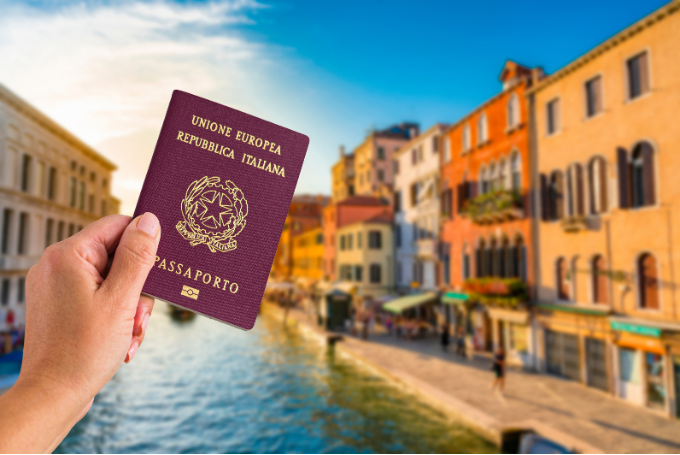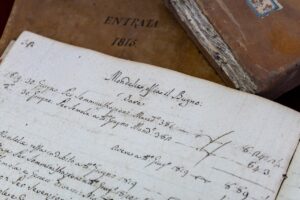Whether you’re exploring citizenship by descent or marriage, we understand that each citizenship path has its unique requirements and challenges.
That’s why we’ve compiled this comprehensive set of FAQs – to answer the basic questions you might have when first starting to even think about your citizenship journey.
From understanding eligibility criteria to preparing for the consular appointment, this article aims to provide you with clear and practical information that will ease some of the anxiety you might be feeling entering the complex world of acquiring Italian citizenship.
Do I have to speak Italian to get Italian citizenship?
For a citizenship by descent application, knowledge of Italian is not a requirement. It is a requirement for citizenship by marriage procedures.
Do keep in mind that some consular clerks like to hear a couple of words in Italian. It’s a plus in their book, but it doesn’t affect the process at all.
How long does it take to get Italian citizenship?
It is very difficult to provide a specific timeline, as there are many variables.
In most cases, the timeline will depend on your consulate of jurisdiction. If for example, you are applying in a consulate that has a short waiting time (month to a couple of months), in the best-case scenario you would be able to apply approximately a year and a half after you first started requesting documents.
This will again depend on the state where most of your and your ancestors’ documents come from. Document request processing times can vary from a month to 9 months depending on the state of origin.
Then for example, if you are applying at a consulate where the waiting time for an appointment is 3 years, even if ready a year early you would have to wait for the appointment.
Following the appointment, the consulate’s recognition times vary again. Most wait the full two years for the recognition, some a year and a half, and only one consulate recognizes the next day (at the moment of writing this article).
All of the above variables can change, depending on the Vital Records and Consulate’s workload or other external factors as was the global pandemic.
How much does acquiring Italian citizenship cost?
We know you don’t want to hear this, but – it depends. The cost of the Italian citizenship journey greatly depends on whether you are DIY-ing, getting some help from professionals or letting professionals handle the whole process. Check out the Our Services page to see how we structure our rates.
What is the 1948 rule for Italian citizenship?
Before January 1st, 1948, Italian women couldn’t pass on citizenship or lost it upon marrying a foreigner. Therefore, for any descendants born to a woman prior to the above-mentioned date, the administrative procedure via the consulate is not a possible path for the recognition process. These cases are filed through the Italian courts and typically request retroactive application of the 1948 law to recognize citizenship via a female ancestor
What is Italian citizenship by descent?
Jure Sanguinis, directly translated as “right of blood,” is the cornerstone of Italy’s legal principle governing citizenship rights. As opposed to Iure Soli determining nationality based not on the birthplace, Iure Sanguinis determines nationality based on one’s ancestry.
Since Italy’s unification in 1861 and its 1865 Civil Code, the notion of dual citizenship existed. However, it has been governed by varying laws over the years. A watershed moment came in 1992 when Italy officially allowed dual citizenship, ensuring that naturalization in another country from then on would not result in the loss of Italian citizenship.
Find out more about Jure Saniguinis here.
Can I apply for Italian citizenship if I can’t locate my ancestors’ marriage records?
The absence of a marriage record of your in-line ancestors may become an obstacle to your citizenship recognition. As opposed to the US, a marriage record in Italy is proof of paternity. If your Italian citizenship is being transferred through a male ancestor, a marriage will be an indispensable document to retrieve.
The same is valid if the child was born prior to marriage -you would need to find additional documents to confirm the paternity.
Even if you cannot locate the official marriage records, there might still be a way around it. Please contact our specialists at [email protected] for a free consultation to see how we can help you.
What documents do I need to apply for Italian citizenship?
Commonly required documents include birth certificates, marriage certificates, death certificates, naturalization records, and other documents establishing the family connection.
Find out more here.
Can my spouse apply for Italian citizenship?
Yes, your spouse can apply for citizenship on the basis of marriage once you have been recognized.
Alternatively, for women married before April 27, 1983, there is a simplified procedure. Most of the consulates will still require you to be recognized first, but it is best to check with the consulate how they would like to proceed.
Can I pass Italian citizenship to my children?
Yes, Italian citizenship acquired through descent can be passed on to future generations. If your children are still minors they will receive citizenship automatically as long as you register them in your AIRE and register their births. If they were not registered as minors, they would need to go through the Iure Sangunis procedure themselves.
Do both parents need to be Italian in order to qualify for Italian citizenship?
No, typically having one Italian parent or grandparent is sufficient to qualify for citizenship by descent.
Can I apply for Italian citizenship at a different consulate?
No, you can only apply at a consulate that has jurisdiction over your residency area.
Do I get my Italian passport at the citizenship appointment?
No, your citizenship appointment is a moment where you apply for the recognition of your citizenship. Only once your citizenship has been recognized can you apply for the passport.
How do I book an Italian consulate appointment and what do they look like?
To book an appointment you would first need to create an account at prenot@mi. Then you would need to check at the consulate’s website which date and time they release appointments. Most of the consulates release them at midnight Rome time on a specific day of the week or day of the month.
Booking an appointment should be easy, but in most cases, it is not. In an ideal situation, you would log in 5-10 minutes earlier, wait for the citizenship link to open up, click it, find a free date on the calendar, and book.
However, due to a massive interest in the process, at the time of booking everyone and their mother is using prenot@mi at the same time.
This causes errors, loading issues, and system logouts, and creates an overall frustrating experience. Booking an appointment will require consistency, dedication, and patience, above all.
What happens at an appointment varies from consulate to consulate. In some cases, documents are mailed in and there is no traditional appointment or interview. Some consulates require mail-in and a phone interview, and others an in-person appointment.
Whether it is a phone interview or an in-person one, it all boils down to a couple of basic questions such as “Why do you want Italian citizenship” and a walk through your documentation with possible questions on the documentation itself.
What are amendments and how long do they take? Why are they important?
Amendments are corrections to your documentation. These can be very simple corrections such as changing Giusepi to Giuseppe or adding an AKA (also known as) to a death certificate. AKA is to show the link between the birth name and the name the ancestor used throughout their life. For example, Giovanni aka John.
While in most cases Giuseppe becoming Joseph and Joe will be tolerated by many consulates, as it is an Americanization, more complex discrepancies will need to be addressed with amendments, or in certain states with a court order.
All of this is needed to prove your lineage and your Italian citizenship claim.
Why does the Italian consulate need my divorce information?
All of the applicant’s documentation needs to be up to date and registered with the Italian municipality (Comune). If for example, you are remarried, the Comune will not register your current marriage until your divorce has been registered.
My ancestor never naturalized. Can that affect my Italian citizenship case negatively?
No, a lack of naturalization can only go in your favor. It cannot harm your case in any way. A problem would be if there is some evidence that your ancestor naturalized, but the naturalization cannot be found.
Why do we need sacramental records for Italian citizenship?
Sacramental records are a great resource to fall back on when we cannot locate a birth or a marriage certificate. While the consulates do not mention this on their Citizenship by Descent information documents, most of them will accept a sacramental record if there is proof that an official certificate cannot be found.
What is jure sanguinis?
Jure Sanguinis, meaning “by right of blood,” is a principle in Italian nationality law that allows individuals with Italian ancestry to claim Italian citizenship.
Learn more here.
Am I eligible for Italian citizenship by descent?
Eligibility is typically based on having at least one Italian ancestor in your direct lineage, often a parent, grandparent, or great-grandparent.
While there are many laws governing eligibility, one of the most important ones is that the ancestor did not naturalize as a citizen of a different country before the birth of the next in line, and before July 1, 1912.
Not sure if you are eligible? Fill out our Free Evaluation Form here!
How far back can I go to claim Italian citizenship?
You can go as far back as long as the ancestor through whom you are claiming citizenship was born or alive after the date of unification of Italy (March 17, 1861)
Can I claim Italian citizenship if my ancestor naturalized before my birth?
There are very specific cases and regulations under which this may be possible. While you may not apply through the standard administrative procedure (via consulate) you may be eligible to petition the Italian court.
There are too many variables to give a definitive answer. If you believe you may have such a case, please reach out to us at [email protected]
Where do I apply for Italian citizenship recognition?
Applications are usually submitted to the Italian consulate or embassy in the country where you reside.
Can I apply for Italian citizenship if my Italian ancestor was born in a different region of Italy?
Yes, you can apply regardless of the specific region in Italy where your ancestor was born. However, you need to pay attention to regions that were annexed to Italy at a later date, such as some northern territories. For those areas it is important that the ancestor did not emigrate prior to annexation.
Have any questions about the Italian citizenship application process? Our Citizenship Specialists will be happy to assist you, contact us throught the Contact page and we’ll get back to you in 48 hours or less!





